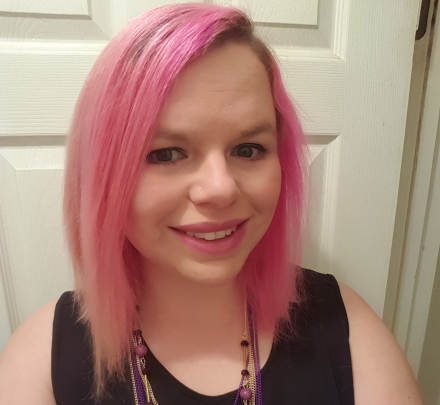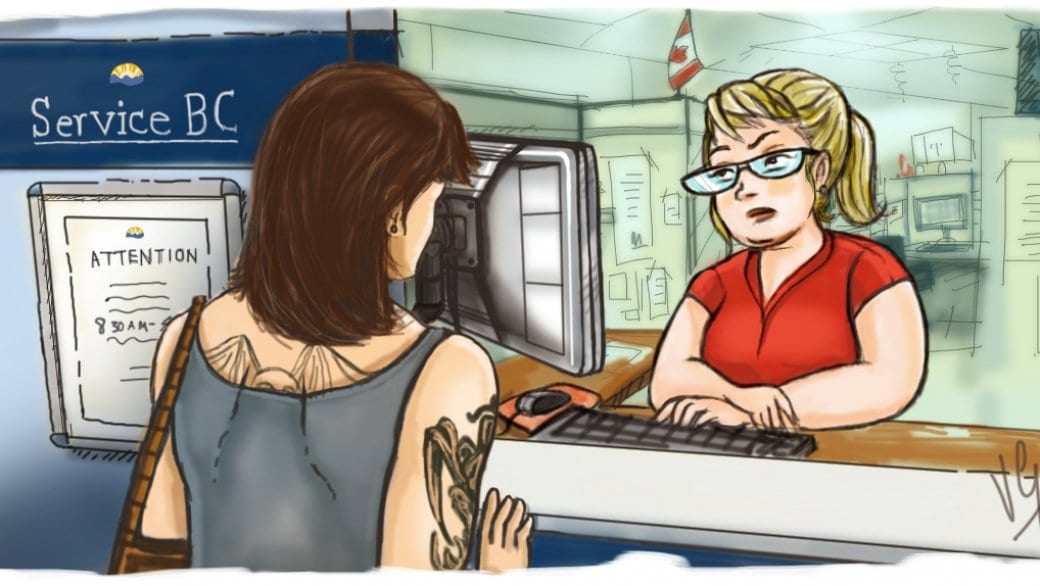Two trans people in northern BC say employees at Service BC offices in Prince George and Prince Rupert misgendered them and treated them poorly.
Alexis, who asked Xtra not to publish her last name for fear of discrimination, says she went to the Service BC office in Prince George to legally change her name and gender designation on her birth certificate, when she was repeatedly misgendered. She says the employee referred to her as male, and called her by her “dead name” despite repeated corrections.
”She didn’t really care how many times I corrected her, she just kept calling me male,” Alexis alleges. “When I asked to use the washroom there, she tried to make me use the men’s washroom, which was awful. I’m really not comfortable in there.”
Alexis was born outside BC, which required the employee to make additional phone calls to clarify information. While on the phone with other offices, the employee continued to refer to her as male, Alexis says.
“It’s not like I’m asking for the world here — just don’t misgender me for an hour and a half straight when I corrected you five or six times,” Alexis says. That’s a “flat-out insult.”
“You’re sitting there invalidating a process that I have bled for, that I have fought for — my identity,” she says.

She says the problem seemed to extend to more than just the employee who served her, as other staffers also ignored the new information she submitted. “I was trying to change my ID but everything they were going off of was my old ID; they really didn’t pay much attention to what was on my forms,” Alexis says. “I think I would have had that issue with everybody.”
She has yet to file a formal complaint with the Service BC office.
Krystal Vandenberg, president of the Northern Pride Centre based in Prince George, says a second trans person recently told her about a similar experience at a different Service BC office. As a result, Vandenberg made a Youtube video on the subject.
Vandenberg says the second complainant, who wishes to remain anonymous, also reports being referred to by the wrong pronouns and name at the Service BC office in Prince Rupert, while changing their name and gender marker on legal documents. The complainant’s repeated attempts to correct staff went unheeded, Vandenberg notes.
“I think it’s a lack of training; I also think it’s the climate we live in,” she says. “Prince Rupert and Prince George are both in Northern BC, obviously, so there does tend to be conservative values. I’m not saying people are purposely being transphobic,” Vandenberg adds, “but they just might not have the education about trans rights and trans issues.”
She says she would like to see front-end workers have specialized training in trans rights and trans issues. “It’s really not that hard to respect people’s pronouns and names; it’s a simple process.”
For many people, making a complaint at the office where they were mistreated can be problematic, Vandenberg points out. “It’s that re-traumatization.” She says she has spoken with the Prince George office but was told they’re unable to process a complaint without the complainant coming forward. She says she would like to see the office accept advocacy on behalf of a complainant as a legitimate form of notice.

“In Northern BC, outing a trans person — outing a trans person anywhere — is extremely dangerous,” she warns.
According to the Ministry of Technology, Innovation and Citizens’ Services, which oversees Service BC, staff are trained to treat all citizens with respect and dignity.
Still, no new changes have been made to Services BC’s procedures following last July’s amendment to the BC Human Rights Code, which now explicitly includes gender identity and expression in the list of grounds protected from discrimination.
In a statement, Beverly Dicks, the assistant deputy minister responsible for Service BC, says employees are already offered sensitivity training through a certified course, must take an oath of employment, sign standard of conduct statements, and take a privacy course to maintain client confidentiality.
“Every client is expected to be provided with a safe environment that is free from discrimination and harassment. No client should ever feel they are receiving less than that when they are at one of our offices,” Dicks says.
She invites Alexis to contact her directly about her experience at the Prince George office.
“I would like to extend my sincere apology to our client and hope to get the opportunity to resolve her concern and to ensure Service BC takes the steps necessary to ensure this does not occur again,” Dicks says.
Alexis says she worries that others may have to deal with similar treatment. She began transitioning a year and a half ago and says the process of changing documents is difficult enough as it is.
“Things can be very discouraging,” she says. “It’s an insult to my existence, is how it felt.”

 Why you can trust Xtra
Why you can trust Xtra


